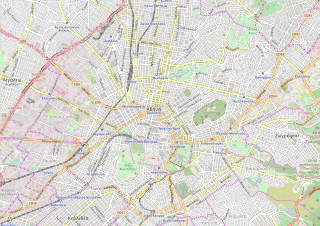Hadrian's Library
Hadrian's Library was created by Roman Emperor Hadrian in AD 132 on the north side of the Acropolis of Athens.[1][2]
Βιβλιοθήκη του Αδριανού | |
West wall of the Library of Hadrian | |
 Shown within Athens | |
| Location | Greece |
|---|---|
| Region | Athens |
| Coordinates | 37°58′32″N 23°43′34″E |
| Type | Library |
| History | |
| Material | Marble |
| Founded | 132 AD |
| Periods | Classical era |
| Cultures | Ancient Greece, Ancient Rome |
| Associated with | Emperor Hadrian |
| Site notes | |
| Ownership | Public property |
| Management | Minister for Culture |
| Public access | |
The building followed a typical Roman Forum architectural style, having only one entrance with a propylon of Corinthian order, a high surrounding wall with protruding niches (oikoi, exedrae) at its long sides, an inner courtyard surrounded by columns and a decorative oblong pool in the middle.[3] The library was on the eastern side where rolls of papyrus "books" were kept. Adjoining halls were used as reading rooms, and the corners served as lecture halls.
The library was seriously damaged by the Herulian invasion of 267 and repaired by the prefect Herculius in AD 407-412.[4] During Byzantine times, three churches were built at the site, the remains of which are preserved:
- a tetraconch (5th century AD)
- a three-aisled basilica (7th century), and
- a simple cathedral (12th century), which was the first cathedral of the city, known as Megali Panagia.
Around the same period as the cathedral another church, Agios Asomatos sta Skalia, was built against the north facade, but it is not preserved.
- View from south. Here is visible the tetraconch, built in the court of the library
.jpg) Stone inscription inside the Library of Hadrian honouring Hadrian
Stone inscription inside the Library of Hadrian honouring Hadrian Relief fragment of a Gorgoneion. Museum at Hadrian's Library. 2nd century AD
Relief fragment of a Gorgoneion. Museum at Hadrian's Library. 2nd century AD
References
- Choremi-Spetsieri, A. The Library of Hadrian at Athens: Recent Finds. Ostraka 4. pp. 137–147.
- "The Library of Hadrian". The Stoa Consortium. Retrieved 2009-02-19.
- "Library of Hadrian Description". PlanetWare. Retrieved 2009-02-19.
- "Hadrian's Library". Athens City Guide. Retrieved 2009-02-19.
External links
